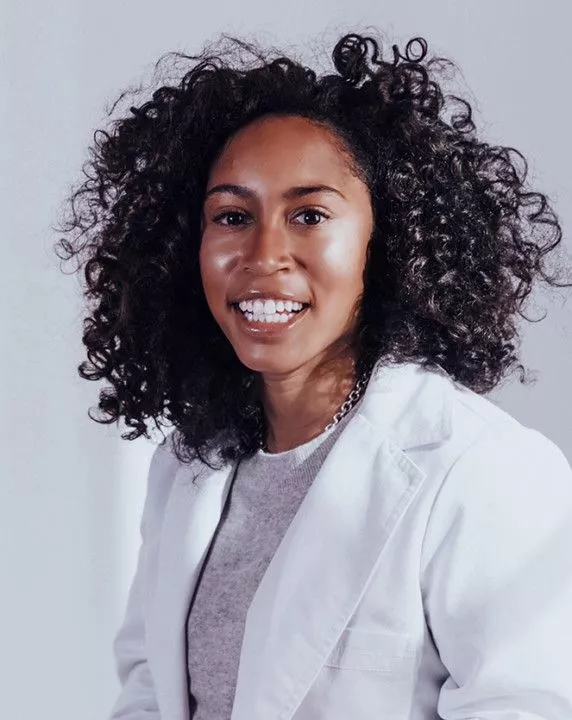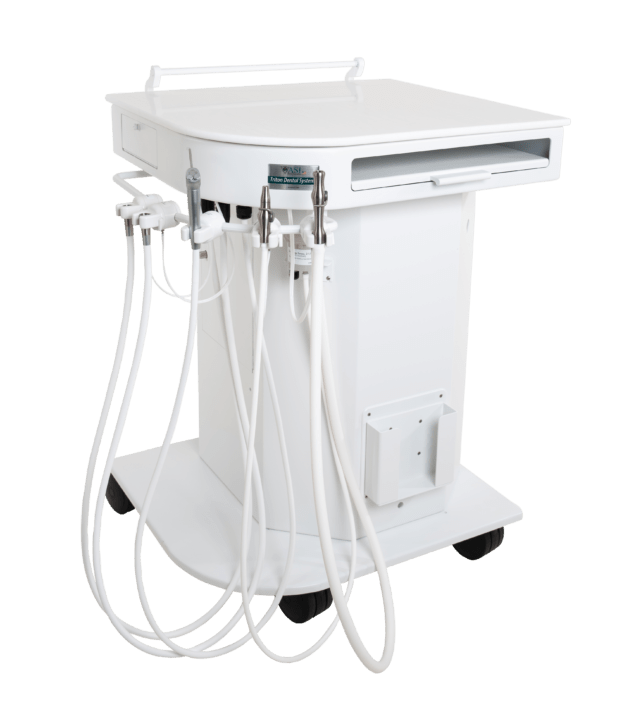Mobile dental carts offer benefits beyond portability and flexibility. Today’s best models also deliver a potential air-quality boost.

Rolling thunder: Dr. Tera Poole sings the praises of ASI mobile carts, which use hydrophobic filters effective down to 0.2 microns to capture bacterial and viral agents.
WHEN ENTREPRENEURIAL orthodontist Dr. Kjeld Aamodt founded Uniform Teeth, a six-location practice in San Francisco, Seattle and Chicago, he specified the use of ASI brand mobile dental carts for all offices. Yet with no particular practice need making an obvious case for their use, why did Dr. Aamodt select them?
Uniform Teeth’s clinical director, Dr. Tera Poole, says there were actually a range of considerations: “On a practical level, it allows flexibility in terms of setup and organization.” Though the practice chose closed treatment rooms for all its locations, the ease of adjusting each room’s layout—or even converting rooms from, say, treatment to consultation was highly appealing.
More than that, Uniform Teeth is committed to a clean, minimalist aesthetic that suits not only the practice’s ultra-high-tech bent but also its patient-centric philosophy, via carefully considered interior design focused on telegraphing a profound sense of calm professionalism. The mobile carts are integral to each office’s design, and the need for fewer cords and pedals helps further streamline their appearance.
“Particularly in orthodontics, a lot of little decisions add up to big differences,” Dr. Poole says. “At Uniform Teeth, we try to be meticulous about all aspects of what we do, including making sure we’re on-brand down to the smallest details. The ASI units have a look we want that contributes to the overall design.”
Says Dr. Aamodt: “I chose these ASI units after scouring and testing other traditional and mobile units. These offer a ton of advantages over the alternatives. For one, they’re quiet, strong and reliable. Others were noisy, bulky and required huge installation costs. Many locations I wanted to be in restricted how we could place traditional air, water or suction lines, which was limiting. These units gave us the freedom to design a more patient-centric practice.”
Like most progressive practices today, Uniform Teeth pays close attention to ambient air quality amid the pandemic. So when ASI approached the practice early on to help test its new Suction Exhaust Bacteriostatic Filters for the carts, Dr. Poole and the team were enthusiastic about adding another layer of safety. ASI’s hydrophobic elements are rated to filter air exhaust down to 0.2 microns for bacterial and viral agents, and they’re now standard equipment on all new models.
 Add it up, and it becomes clear why this fresh take on carts is booming in popularity. Uniform Teeth even found a silver lining when Covid-19 lockdowns temporarily shuttered its Seattle locations. “When we needed an extra unit in San Francisco, we were able to ship one from one of our offices in Washington to California,” Dr. Poole says. “Even though there are costs associated with a move like that, it was much less than buying a complete new cart.”
Add it up, and it becomes clear why this fresh take on carts is booming in popularity. Uniform Teeth even found a silver lining when Covid-19 lockdowns temporarily shuttered its Seattle locations. “When we needed an extra unit in San Francisco, we were able to ship one from one of our offices in Washington to California,” Dr. Poole says. “Even though there are costs associated with a move like that, it was much less than buying a complete new cart.”




